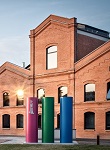Aeroporti di Roma and Hera Group work together to further develop a circular approach to operational process management at Rome’s airports
Hera Custom Facet Publish Date
Category Facet
Custom Facet
Search Bar
Asset Publisher
Aeroporti di Roma and Hera Group work together to further develop a circular approach to operational process management at Rome’s airports
Thanks to an agreement recently renewed for an additional two years, Hera is supporting the company managing the Fiumicino and Ciampino airports to develop circular initiatives aimed at reducing non-recoverable waste, improving recycling rates and making water consumption more efficient.
Aeroporti di Roma (ADR) and Gruppo Hera have joined forces to make Rome's Fiumicino and Ciampino airports increasingly sustainable, further developing the circular approach to resource management that has led Rome's airports to send all waste produced by passengers for recovery and to save over 1.4 million cubic metres of drinking water by 2024, using treated water for reuse for all uses where potable water is not strictly necessary.
A protocol for the circular management of Rome’s airports
The agreement between ADR and the Hera Group, renewed for another two years after an initial protocol launched in 2022, aims to continue along the path of continuous improvement in waste and water cycle management at the Leonardo da Vinci (Fiumicino) and Giovan Battista Pastine (Ciampino) airports. This project is part of ADR’s sustainability plan, that sets sustainable process management at the heart of the company’s strategy.
“As Hera Group, we are the driving force for the circular economy in Italian industry, able to provide services to large companies for a sustainable management of waste, reducing it and valorising it with material and energy recovery. This is why we are proud to put our expertise and long-standing expertise in the process of circular waste management and resource regeneration at the service of Aeroporti di Roma, one of the most important operators in the European airport management sector. Bolstered by our experience, we accompany ADR in their green transition, to achieve their ESG targets and increasingly ambitious goals in terms of recycling, efficiency and reduced environmental impact. Working together to make waste and water management processes more sustainable makes a solid contribution to a new development model, in which the recovery and regeneration of resources create economic, environmental and social value. We believe that the challenge of sustainability can only be won together, building partnerships that transform circularity projects such as those involved in the agreement with ADR into concrete results that combine sustainability with competitiveness” - Orazio Iacono, CEO of the Hera Group.
“Sustainability and innovation are at the heart of Aeroporti di Roma’s strategy. We have set ourselves the ambitious goal of zero emissions at our airports by 2030, twenty years ahead of European targets for the sector. We recently inaugurated the largest self-consumption photovoltaic system in a European airport, but our commitment to the green transition extends beyond decarbonisation. For us, the responsible use of resources is essential, and we have therefore launched numerous initiatives and projects with a focus on reducing environmental externalities and circular resource management. Sustainable waste management is one of our priorities. Thanks to targeted measures, such as the reconfiguration of collection points and cooperation with sub-concessionaires, we have increased sorted waste collection in our terminals, ensuring that all waste produced by passengers is sent to recovery facilities. Optimising water management is also one of our strategic goal. We have implemented a dual water network that uses treated water from recycling or catchment, reducing drinking water consumption per passenger by 65% compared to 2012. We are proud to continue our collaboration with the Hera Group, whose know-how in this sector will help us continue along the path of an increasingly conscious use of resources” - Marco Troncone, CEO of ADR.
Waste: more recycled, less discarded
In 2023, thanks to the collaboration with the Hera Group, it was possible to map with extreme accuracy what the final destination of waste produced at Fiumicino and Ciampino airports, to know, for example, how much of it was recovered as materials and how much went to energy recovery. The Hera Group’s know-how in this area has been particularly valuable, given that since 2012 it has developed a certified report (“Tracking down waste”) that certifies the actual percentage of waste collected in the areas in which the Group manages municipal waste collection.
In 2024, Fiumicino and Ciampino airports produced over 13,000 tonnes of waste. All the waste produced by passengers was sent for recovery, a result achieved thanks to the effective door-to-door separate waste collection system. Moreover, based on this methodology developed with Hera, it is expected, already by 2025, to further improve the recovery of different types of waste, with a focus on packaging and other significant sectors, to promote prevention, reuse and recycling. Concrete actions will thus be put in place for each type of waste, to reduce waste production and maximise the most virtuous forms of recovery. This will also be achieved by raising awareness and proactively involving the sales points and activities present within the airport, as well as passengers, by providing precise instructions to encourage waste reduction, the use of more easily recyclable materials and the separation of waste following usage.
Water: more efficient management and recovery of the resource
Sustainable use of the water resource is a priority strategy for ADR. At Fiumicino Airport, potable water is used for less than 30% of the airport's uses. Thanks to the presence of a dual network, ADR only uses potable water for those uses for which it is actually essential; in other cases it uses “treated” water from recycling or capture. Through advanced monitoring systems based on IoT technologies, the Hera Group and ADR are working to minimise the risk of any leaks or anomalies in the water network of the two Rome airports, thus further reducing the risk of waste. In particular, a project was introduced to develop a district-based drinking water network to allow for a real-time measurement of flows and pressures and thus promptly detect any faults. Based on an analysis of previous data, a network monitoring system was launched to contribute to a more efficient management of water as a resource. Furthermore, thanks to our collaboration with Heratech, the Hera Group’s engineering and laboratory analysis company, water quality monitoring initiatives with continuous analysis can be developed. Moreover, during the next year and a half, the Hera Group will share with ADR its twenty years of experience in drinking water management, and a modernisation of the centralised disinfection system in the Fiumicino network will be evaluated. Process optimisations at the airport’s industrial water treatment plant will also be implemented, to reduce wastewater consumption and increase reuse in view of the circular economy.
Wastewater management, an increasingly circular approach
Fiumicino Airport, like a medium-sized city, is equipped with two wastewater treatment plants that are directly managed by ADR. Wastewater treatment is an important element of the airport management process, and is another key aspect of the collaboration between ADR and the Hera Group. For several years now, ADR has been using a dual water network, separating the use of drinking water from that of treated water for reuse, and the water resulting from the purification process is reused for airport uses (toilets, heating systems, watering and fire-fighting systems). Thanks to the support of Herambiente Servizi Industriali (HASI), the Hera Group subsidiary specialising in industrial waste treatment and recovery, it has been possible to further develop a sustainable approach to wastewater management by implementing and upgrading water purification systems; the sludge resulting from this process is sent to composting plants for reuse in agriculture. HASI has helped improve the efficiency of wastewater treatment plants at both Fiumicino and Ciampino, identifying interventions to decrease energy consumption, chemicals used in pollutant abatement processes and sludge production, with a consequent reduction of CO2 emissions and transport and treatment costs.


.jpg/a418ee11-30c3-c1f9-fb4f-28798f88f103)
.jpg/06437ce4-bf74-f276-9831-f0bc8f20430a)

.jpg/655e453a-41aa-f3b9-6e0a-9c054d7b4006)